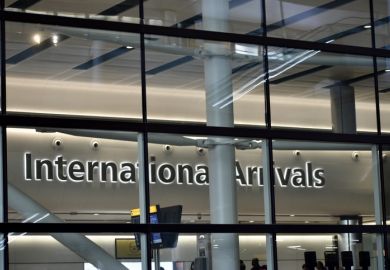Source: Alamy
Lesson plans: higher education institutions are losing teacher training places to schools as Ofsted ratings shift the balance
Universities have suffered under Ofsted teacher training inspections since Michael Gove unveiled plans to increase school-based training, in what some claim is a politicised inspection regime that will cost institutions places.
Ofsted, led by chief inspector of schools Sir Michael Wilshaw, began inspections under a new framework for Initial Teacher Training (ITT) last autumn, after the education secretary had announced a major expansion of School Direct, the school-led training path, in July 2012.
Under the new system, providers are rated 1 (outstanding), 2 (good), 3 (requires improvement) or 4 (inadequate).
Only providers classed as outstanding are guaranteed to keep their core allocation of student numbers for 2013-14 and 2014-15.
Figures supplied to Times Higher Education by Ofsted show that the proportion of inspections at higher education institutions gaining an “outstanding” rating has fallen from 30 per cent under the old framework to 13 per cent under the new one.
However, the number of school-centred and employment-based providers rated “outstanding” has risen from 24 per cent under the old framework to 32 per cent under the new.
One vice-chancellor, who did not wish to be named, said there were “concerns in many HEIs about the politicisation of Ofsted and whether its historic independence as Her Majesty’s Inspectorate is being sustained”.
An Ofsted spokeswoman said: “We entirely refute any suggestion that our inspection judgements are driven by the government’s School Direct policy or any other hidden agenda. We report on what we find.”
Loss of income
Durham University and the University of Birmingham are the only higher education institutions to have been rated “outstanding” under the new framework, with critics saying that it fails to recognise excellence at larger providers.
Higher education institutions with a major presence in ITT face big losses in income if they fail to gain an outstanding rating and lose places as a result.
Analysis by THE shows that out of 12 higher education institutions inspected under the new framework, seven have experienced a fall in their grades compared with their last inspections under the old framework.
Four have stayed the same, while one has gone up (the University of Bedfordshire recovered a grade for primary ITT, rising to “good”).
Ofsted figures show that as at 31 May, of the 32 inspection judgements for higher education institutions across their primary, secondary and employment-based provision, four were found to be outstanding (13 per cent), 22 were good (69 per cent) and six required improvement (19 per cent).
In general, higher education institutions were rated lower than school- and employment-based providers where, of 22 inspection judgements, seven were found to have been outstanding (32 per cent), 11 were deemed good (50 per cent) and four were found to require improvement (18 per cent).
The University of St Mark and St John was rated outstanding for the quality of its primary provision under the old framework in 2010 but is now rated “requires improvement” under the new framework.
London South Bank University went from being rated “good” on the quality of its primary and secondary provision to being rated “requires improvement”.
And Liverpool Hope University went from being rated “good” on primary provision to “requires improvement”.
‘Challenging for bigger providers’
James Noble Rogers, executive director of the Universities Council for the Education of Teachers, said that the new framework was “particularly challenging” for “bigger providers”. “It is against you if you have trainees who are thought to require improvement,” he continued. And the more students a provider has “the more likely it is you will have more trainees that require particular support”, he added.
However, Mr Noble Rogers said Ofsted had been “quite right to raise the bar” and said the performance of universities under the new system had been “very good and positive”.
An Ofsted spokeswoman said the new framework “has raised the bar by looking at the outcomes for trainees, quality of training across the partnership, and leadership and management of the partnership.
“Where our inspectors identify any shortcomings in these areas, we will say so and judge accordingly, regardless of the type of ITE [Initial Teacher Education] provision under inspection.”




